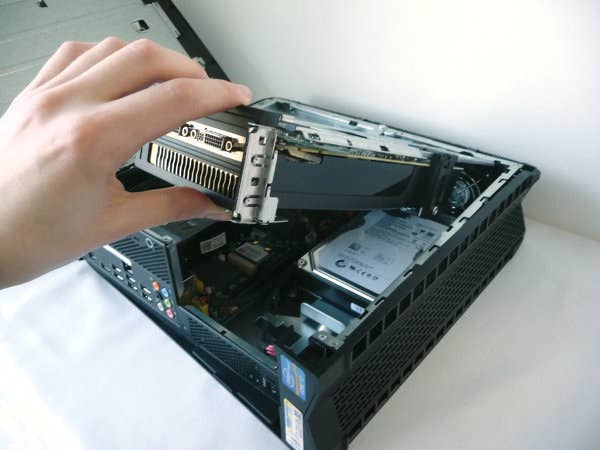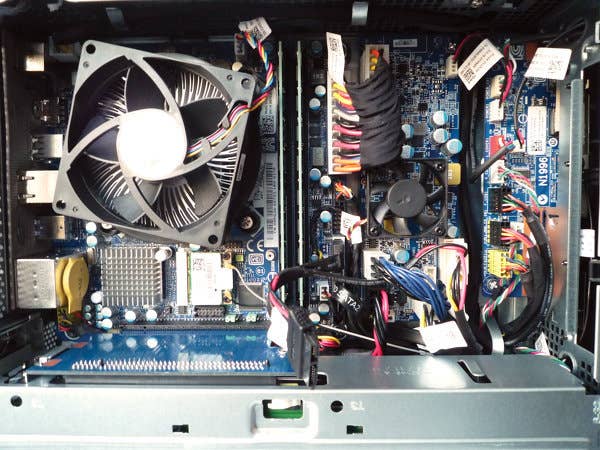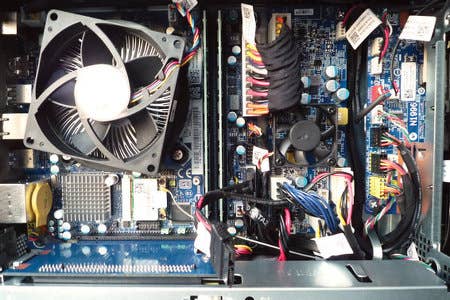Steam Box: Could Valve Make a Games Console?
Digital Foundry assesses the remarkable rumours surrounding an open games platform
Valve making a games console? That can't be right, surely? The Verge's recent story suggests that the creators of Half-Life and Steam are putting together a hardware spec with "associated software" and creating an open platform that anybody can use to make their own Steam-compatible games machine, an initiative described as being akin to Android for consoles. There's even the suggestion that Alienware's recently released X51 is the first of these "Steam Box" designs, and will be firmware-upgraded to provide support for the new platform once it materialises.
"Does the notion of a Steam Box actually make any sense? How well is Valve positioned to effectively take on Microsoft, Sony and Nintendo? What form could this machine take?"
Backing up its story, the Verge links to a recent Penny Arcade interview with Gabe Newell where he says that, "If we have to sell hardware we will" suggesting that the company would work in tandem with manufacturers if necessary. That interview is well worth a read as it demonstrates that Valve is clearly well up to speed with the latest advances in hardware, and the underlying ethos at the firm is clearly against the closed platforms favoured by the traditional platform holders.
But does the notion of a Steam Box actually make any sense? How well is Valve positioned to effectively take on Microsoft, Sony and Nintendo? What form could this machine take?
There is a sense that the unit being suggested by the Verge article is an "all things to all men" design that perhaps sounds too good to be true. The spec is described as a Core i7 Intel CPU, backed up by an NVIDIA graphics core and 8GB of RAM (which some believe is a mis-understanding derived from a test machine Valve lashed up to showcase its new UI). The Verge article makes mention of a fixed platform architecture as being the key motivator behind this endeavour, but that doesn't really make a whole lot of sense for an initiative based on the concept of an open gaming platform - and you have to wonder what the advantage would be for the hardware vendors actually manufacturing the device if there is only very limited potential for competition.
Perhaps more likely is that Valve is developing its own APIs that will allow PC games developers to run their wares on a range of different platforms. Already Valve has its own networking and online systems - why not expand that to include other elements such as graphics rendering, file systems and audio? These could sit on top of any current OS - be it Windows, OSX, or even a custom Linux kernel for a games console - and allow game-makers to gain pretty much instant access for their games across a range of platforms that far exceeds the PC on its own.
"Perhaps more likely is that Valve is developing its own APIs that will allow PC games developers to run their wares on a range of different platforms - which might include a console at a later date."
Moving beyond computers and into the realm of console gaming would obviously be an excellent means to expand the reach of Steam, has enormous benefit to developers, and would undoubtedly be a Good Thing for gamers too. Buy your game on Steam, play it on the Mac in the study, migrate seamlessly to the console in the living room and grab a sneaky lunchtime session or two at the PC at work, with game progress all synchronised via Steam Cloud. Valve's ethos is unashamedly platform agnostic, which should also mean that there would be cross-platform compatibility for online gaming too where appropriate - something we've already seen working in Portal 2 for example, where PC and PS3 owners can tackle co-op in the same game instance.
But is the whole concept of Valve designing an entire platform simply a step too far for the company? Can a software developer seriously take on the likes of Sony and Microsoft? Well it's safe to say that when it comes to talent at least, Valve is a remarkably well-stocked company. There's the perception among developers that the company hires the best people even if there is no clear, distinct position for them - Valve simply wants the best minds it can get. Indeed, one developer described the company to me as the place you end up "if you've been good in a previous life".
Clearly the company has a knack for attracting top-tier engineers and developers, encompassing a range of fields. For example, it's not entirely clear quite what ex-Microsoft engineer Bruce Dawson does day-to-day at Valve (optimisation and bug-fixing is all that's mentioned), but he's well known amongst developers as the man who wrote the book on extracting maximum performance from the Xbox 360's Xenon CPU. Also, as pointed out on Twitter yesterday by Sony Santa Monica's Director of Technology, Christer Ericson, "American entrepreneur and self-taught computer chip designer", Jeri Ellsworth, is also now employed by Valve, but isn't mentioned on the company website.


Were NVIDIA and Intel directly involved in the Steam Box - neither of whom seem fated to be working with Microsoft or Sony on their next consoles - that is also an immense wealth of technological potential. Intel's CPUs are the most powerful in the business, and they have access to the best chip fabrication technology in the world. NVIDIA is also set to make a serious statement of intent with its new Kepler GPU architecture - something I'll be dissecting on GamesIndustry International next week. By getting hardware manufacturers and component suppliers directly involved, as opposed to merely licensing a single design (as is the case with current console manufacturers) there is perhaps more motivation for ensuring that this project is the best it can possibly be.
The Verge report also discusses controllers that measure player biometrics - something that none of the platform holders have really explored yet, but have had a fundamental impact on gameplay in Valve's own in-house experiments, something it has made no secret of.
"When you look at the kinds of experiences we try to create for people, having access to [the] internal state of the player allows us to build much more interesting and compelling experiences," Valve's Gabe Newell revealed in a Steamcast last year.
"So we don't really think that that's in doubt; the question is really about when and in what forms that takes. Even very simple noisy proxies for player-state, like skin galvanic response or heart-rate, turn out to be super-useful and they're very much at the beginning of the kinds of data that you can gather."
"Biometric inputs have had a fundamental effect on gameplay in Valve's in-house experiments - something it has made no secret of."
Valve produced a special build of Left4Dead that mapped biometric data (referred to in-house as the 'arousal state') to each player and displayed it on the in-game HUD.
"When you were playing competitively we found that people were incredibly aggressive towards highly aroused players on the opposing team and were very defensive about highly aroused players on their own team," Newell said.
By mapping the feelings of the player into the game, Valve had managed to fundamentally impact the way in which players were interacting. It's big stuff, and clearly just the tip of the iceberg into the kinds of research the company has been carrying out in its R&D labs. Consoles have been launched on far less compelling concepts.
If this all sounds rather exciting, it's worth noting that there are plenty of stumbling blocks in the path of this dream project - assuming that it is a console in the accepted sense (the Verge article talks about it taking on a games-enabled Apple TV). For a start, there's a matter of compatibility. Backwards compatibility with the Steam library would clearly be a major selling point: all existing titles on the Steam platform would work on the new machine according to the Verge report, which presents us with an interesting puzzle - in theory, the embedded Enterprise version of Windows 7 would be up to the job here, but what are the chances of Microsoft providing the kernel powering hardware that would be competing with its own console?


Secondly there's the concept of producing a financially competitive piece of hardware to challenge the boxes from Microsoft and Sony when there would be no revenue streams for the manufacturers from game sales. Historically, this is what has allowed platform holders to sell their machines at a loss.
The Verge article talks about i7 CPUs, NVIDIA graphics cores and 8GB of RAM - now that encompasses a pretty enormous range of potential parts across a large spectrum of power, but to provide competition for a next-gen Xbox or PlayStation using off the shelf parts, we're looking at something along the lines of the Alienware X51, which costs the best part of £800 - I'd be surprised if we see any next-gen console launch at a price-point north of £299, so there's clearly a value issue here.
There's nothing to stop Valve using cheaper PC parts in their own design of course, and as the Xbox 360 and PS3 demonstrate, addressing hardware more directly can result in substantial performance gains. However, if backwards compatibility is a key component, that means Windows, DirectX/OpenGL and all the issues that come with them. A dual-boot system supporting both the Microsoft OS and a dedicated, performance-orientated kernel is of course an option but would be a bit messy.
"To provide competition for a next-gen Xbox or PlayStation using off-the-shelf parts, we're looking at something along the lines of the Alienware X51, which costs the best part of £800."
There's also the small matter of exclusive games. Where would the Xbox be without Halo, Forza and Gears of War? Would a PS3 purchase be as compelling if it did not have the developmental might of studios like Sony Santa Monica, Guerrilla Games, Naughty Dog and Evolution Studios providing gameplay experiences exclusive to PlayStation platforms? What would make customers choose a Valve console if all of its games were also available on other, perhaps cheaper consoles?
Never mind the console exclusives, could a Steam Box succeed without the support of Electronic Arts? With EA looking to take on Steam with its own Origin platform, the chances of future Battlefields, FIFAs and Need for Speeds coming to a prospective Valve console are obviously diminished - dependent entirely on the hardware being able to run as a PC on an OS supplied by a competing console manufacturer. It's a pretty grim scenario.
All of which perhaps suggests that the rumours are just that, and that Valve aren't developing a console at all, and that The Verge got it wrong. Doug Lombardi, talking to Kotaku and choosing his words very carefully, told us not to expect anything soon, certainly not at E3 2012.
"We're prepping the Steam Big Picture Mode UI and getting ready to ship that, so we're building boxes to test that on," Lombardi said, discussing the new front-end designed primarily for PCs attached to living room displays.
"We're also doing a bunch of different experiments with biometric feedback and stuff like that, which we've talked about a fair amount. All of that is stuff that we're working on, but it's a long way from Valve shipping any sort of hardware."
All of which sounds pretty conclusive, but the question is - what did actually happen at those "behind closed doors" meetings at CES 2012 which were the basis for The Verge's story? Lombardi is playing down the hardware angle, but well-placed sources at GDC suggest that there's perhaps more meat to the story than the firm is perhaps willing to admit...









